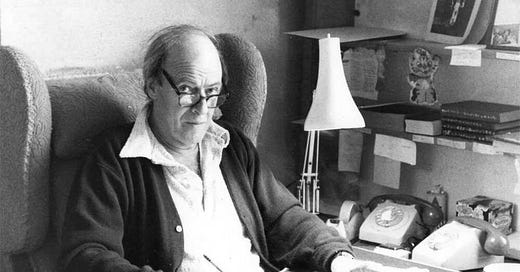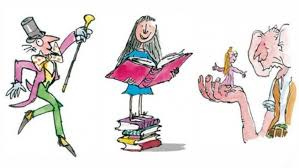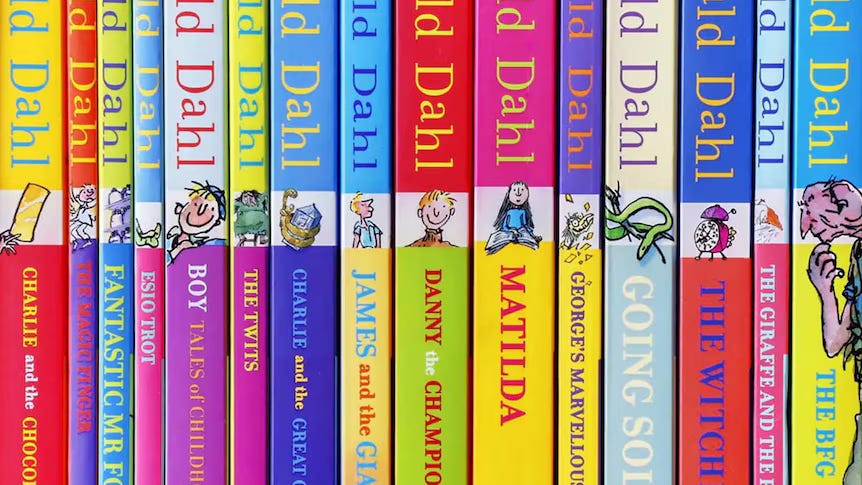"Every sane and semi-intelligent person likes these sort of things."
Roald Dahl stands up for booze, posh flowers, brown furniture, classical music and fine art.
We hacks can write with all sorts of noise going on, of course we can. Even arts reporters. I’m old enough to remember (just) the torrent from typewriters; even with computers, the newsroom is still a loud and erratic place. But creative writers need a room of their own. This week, my husband drew my attention to a video he found on You Tube recorded in 1982 for the daytime BBC institution Pebble Mill At One, about Roald Dahl and the hut where he used to spend four hours a day, every day, writing. Here is Dahl, in the hut.
It is fascinating - largely because of incidental things, things which nowadays would be howled down as examples of colossal privilege, expressed without any embarrassment or shame. Watching it is like opening a door into a long-vanished place where not only class and sexism exists, but also cultural engagement and a delight in rarified, expensive creativity. Could such an artistically ‘elitist’ view be sanctioned anywhere, now? Well, possibly on Radio 3 but certainly nowhere on TV.
Here are the red flags;
1. Attitude of the reporter Frank Delaney
Delaney is extremely respectful, and wears a tie. He has a cut-glass accent, and assumes that viewers will appreciate marmalade and know what tripe is. A distinguished writer himself, he assumes general knowledge of the ‘Hornblower’ historical novelist CS Forester (Forester was the first person to commission a written piece from Dahl). “Oh, indeed!” he says, when Dahl mentions the great man, immediately creating a “we are in the same literary club” feel to the interview.
2. Everyday flirting, casual references to staff, clear sense of wealth
When we first see Dahl at work, he is dictating a letter; “Hello, gorgeous Sinitta,” it starts (to a primary school teacher). A youthful assistant (Hilary) is writing everything down in longhand before typing it up. Hilary also types up his manuscripts. The whole vibe is remorselessly analogue and carelessly hierarchical. Introducing the fact that he writes in a hut, Dahl explains; “I couldn’t possibly work in the house. There are vacuum cleaners, and people bustling about”. Hmm. Presumably, these are people whose salary is paid for by Dahl, a man whom Delaney has told us, (in appreciative tones), has made a LOT of money from his books.
3. Constant smoking and zero personal domesticity
Dahl has a fag visibly on the go at all times for this, a piece on daytime TV. As he settles into his battered armchair, he explains his hut is never tidied up, and hasn’t been cleaned for five years. He’s not making a thing about it. He just says it.
4. Clarity between adult and child
Dahl has no truck with being down with the kids. He is not. He also knows a child cannot write a novel, and says so. “When you are old enough, and experienced enough to be able to be a confident writer, and you are ready to write a book for children, because a child cannot,” he says, “by then you have become adult, and pompous…unless you still have a lot of childishness in you, I don’t think you can do it.” He acknowledges that children take books far more seriously than adults, and that if they like what they read, “that’s not the end of it, you know. It will be read at least four, five, sometimes fifteen times. It’s got to stand up to that.”
Some of Dahl’s inventions, as illustrated by Quentin Blake
5. Unashamed patronage of ‘high’ art.
“I have always loved pictures, and have always collected them,” says Dahl, whilst putting on a LP record of a piano concerto, possibly Beethoven’s Appassionata, (thank you Richard Locke for identifying it). Definitely classical music. We see lovely oil paintings in gilt frames, while the piano concerto plays on. We are told these paintings are expensive.
6. Unashamed alcoholic engagement
“I love wine and have several thousand bottles in the cellar”
7. Unashamed appreciation of brown furniture
“I love furniture, especially 18th century English furniture”
8. Unabashed appreciation of posh flowers
“I love cultivating plants, especially orchids”
9. Proud announcement of existing within the confines of a certain cultural class
“I think every sane and semi-intelligent person likes those sort of things.”
Could Dahl, whose books are still globally treasured, filmed, streamed and consumed even though his persona has been revised somewhat, (not least in the current play Giant), ever have anticipated how the cultural signifiers he considers to be the measure of a good life, have come to be handled in the media, in other words with shame, censure and anxiety?
The interview leaves us with a slight indication that he might have done. Asked how he would like to be remembered, Dahl responds; “You can quote Oscar Wilde, and say; ‘When I am gone, I would like it to be said, my sins were scarlet but my books were read.”
Roald Dahl’s peerless legacy for children








The last newspaper news room I worked in was a dead zone. All the young journalists wrote with ear plugs in, there was zero banter. All communication was done digitally, even with people sitting opposite. If I ever needed to talk to someone in another department I would walk across the floor and introduce myself. The alarm was palpable. One afternoon I got some banter going between the desk I was on and the one behind and the joy and amazement on the young reporters' faces was a beautiful thing. They loved it, but it never happened again. One youngster told me off very rudely when I tried.
Loved this x